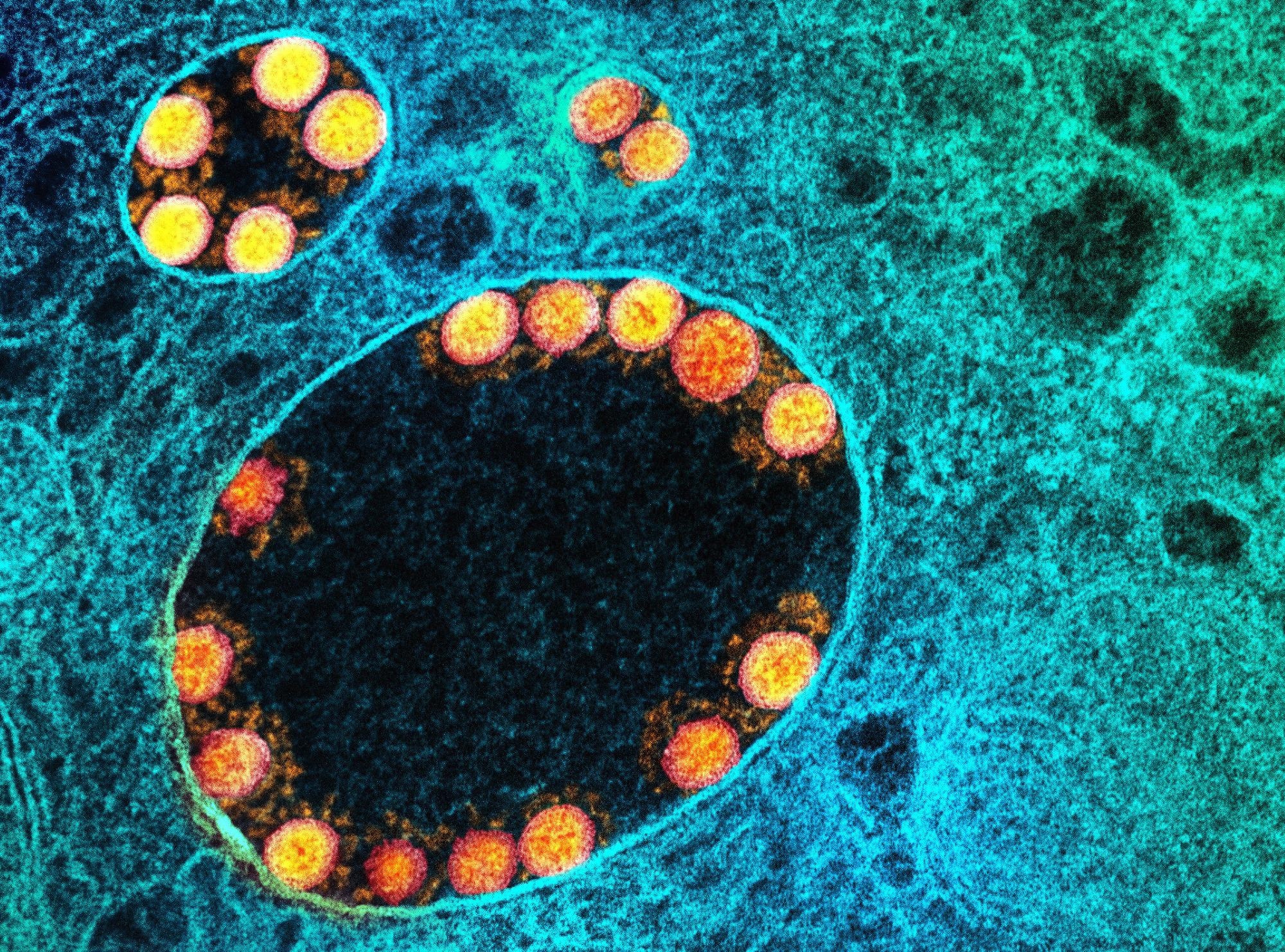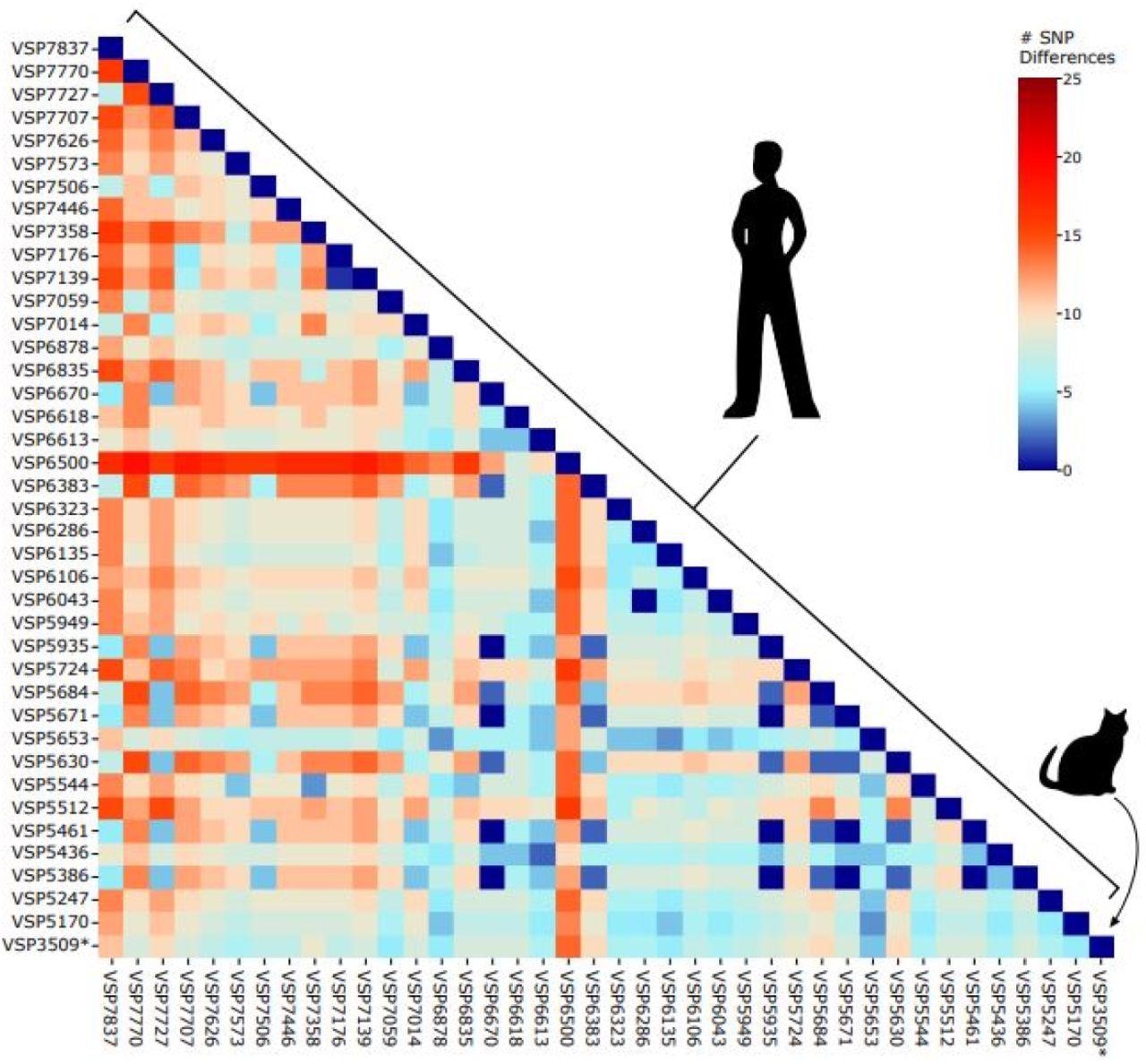The first published case describing the Delta variant of the severe acute respiratory syndrome coronavirus 2 (SARS-CoV-2) in a domestic cat in the United States highlights the realistic scenario of spillover infections with emerging viral variants that threaten human and animal health. The research paper is currently available on the bioRxiv preprint* server while it undergoes peer review.
 Study: Detection and Interspecies Comparison of SARS-CoV-2 Delta Variant (AY.3) in Feces from a Domestic Cat and Human Samples. Image Credit: NIAID
Study: Detection and Interspecies Comparison of SARS-CoV-2 Delta Variant (AY.3) in Feces from a Domestic Cat and Human Samples. Image Credit: NIAID

 This news article was a review of a preliminary scientific report that had not undergone peer-review at the time of publication. Since its initial publication, the scientific report has now been peer reviewed and accepted for publication in a Scientific Journal. Links to the preliminary and peer-reviewed reports are available in the Sources section at the bottom of this article. View Sources
This news article was a review of a preliminary scientific report that had not undergone peer-review at the time of publication. Since its initial publication, the scientific report has now been peer reviewed and accepted for publication in a Scientific Journal. Links to the preliminary and peer-reviewed reports are available in the Sources section at the bottom of this article. View Sources
Infections with SARS-CoV-2, a causative agent of the ongoing coronavirus disease 2019 (COVID-19) pandemic, have spilled over from humans to a myriad of animal species. This includes domestic cats and dogs, but also non-domestic large felids, white-tailed deer, and minks, amongst others.
One of the more threatening variants is the Delta variant, which has been thus far confirmed in one dog in the United States (related to specific AY.3 lineage) and several Asiatic lions in India and three domestic cats in China.
As this variant spreads more easily among humans, is linked to more severe disease, and is associated with much higher rates of vaccine breakthrough infections in comparison to lineages that have emerged earlier in the pandemic, tracking the natural host range is needed to clarify potential zoonotic reservoirs.
In this paper, a research group from the University of Pennsylvania (led by Dr. Olivia C. Renz and Dr. Andrew D. Marques) reported a SARS-CoV-2 Delta variant (AY.3) in fecal specimens from a domestic house cat in the Delaware Valley region of southeastern Pennsylvania.
Molecular testing and whole-genome sequencing
In the study, the authors explain how the 11-year old female cat presented to the Ryan Veterinary Hospital Emergency Service (which is part of the University of Pennsylvania School of Veterinary Medicine) after several days of lethargy, loss of appetite, soft stools and vomiting, as well as with known exposure to SARS-CoV-2 (as one of the cat's owners tested positive before symptom onset).
A fecal sample was sent for polymerase chain reaction (PCR) testing for infectious agents linked to feline gastrointestinal disease (such as specific bacterial, viral, and parasitic agents), but all the results came back negative.
Then the fecal sample was tested for SARS-CoV-2 by utilizing the Centers for Disease Control 2019 Novel Coronavirus real-time PCR (RT-PCR) Diagnostic Panel. The test result came positive, so SARS-CoV-2 whole genome sequencing and phylogenetic analysis have been pursued immediately to obtain the genetic profile of the virus.
High levels of SARS-CoV-2 in cat's fecal specimens
In short, two feline fecal samples that have been collected seven days apart both had cycle threshold values for the detection of SARS-CoV-2 between 26-28, which indicates that there are relatively high levels of genomic replication and high levels of viral ribonucleic acid (RNA).
Moreover, detailed sequencing of the feline-derived viral genomes revealed the two to be indistinguishable and varying by between 4 and 14 single nucleotide polymorphisms in pairwise comparisons to human-derived lineage AY.3 sequences were collected in the same geographic region and within the same time period.
But although fecal samples from the infected cat contained relatively high levels of viral genetic material, SARS-CoV-2 was not found on the oropharyngeal swab taken on the day of presentation to the veterinary hospital.

Pairwise distances between AY.3 sequences in the Delaware Valley. Included are the feline-derived sequence (VSP3509) and human-derived sequences. The number of SNPs separating each pair of lineages is shown by the color code (key to the right of the figure).
The significance of interspecies transmission
The discovery of SARS-CoV-2 Delta variant lineage AY.3 sequence in a feline sample, taken together with the detection of delta variant lineage B.1.617.2 in non-human animal species, implies that transmission of SARS-CoV-2 between species may take place among multiple Delta variants.
"Since domestic felines can support relatively efficient replication of SARS-CoV-2 viral genomes similar to those that infect humans, can transmit SARS-CoV-2 viruses to naïve conspecifics, and frequently have a high degree of contact with humans, they have the potential to become an enzootic reservoir for the virus", say study authors in this bioRxiv paper.
Therefore, the transmission and reservoir formation of SARS-CoV-2 non-human animal species represents a threat to domestic animals, wildlife, and human health. Consequently, there is a need to carefully track SARS-CoV-2 variants of concern in domestic house cats to elucidate the interconnected nature of animal and human health in this pandemic.

 This news article was a review of a preliminary scientific report that had not undergone peer-review at the time of publication. Since its initial publication, the scientific report has now been peer reviewed and accepted for publication in a Scientific Journal. Links to the preliminary and peer-reviewed reports are available in the Sources section at the bottom of this article. View Sources
This news article was a review of a preliminary scientific report that had not undergone peer-review at the time of publication. Since its initial publication, the scientific report has now been peer reviewed and accepted for publication in a Scientific Journal. Links to the preliminary and peer-reviewed reports are available in the Sources section at the bottom of this article. View Sources
Journal references:
- Preliminary scientific report.
Lenz, O.C., Marques, A.D., et al. (2022). Detection and Interspecies Comparison of SARS-CoV-2 Delta Variant (AY.3) in Feces from a Domestic Cat and Human Samples. bioRxiv, https://doi.org/10.1101/2022.01.31.478506, https://www.biorxiv.org/content/10.1101/2022.01.31.478506v1
- Peer reviewed and published scientific report.
Lenz, Olivia C., Andrew D. Marques, Brendan J. Kelly, Kyle G. Rodino, Stephen D. Cole, Ranawaka A. P. M. Perera, Susan R. Weiss, Frederic D. Bushman, and Elizabeth M. Lennon. 2022. “SARS-CoV-2 Delta Variant (AY.3) in the Feces of a Domestic Cat.” Viruses 14 (2): 421. https://doi.org/10.3390/v14020421. https://www.mdpi.com/1999-4915/14/2/421.